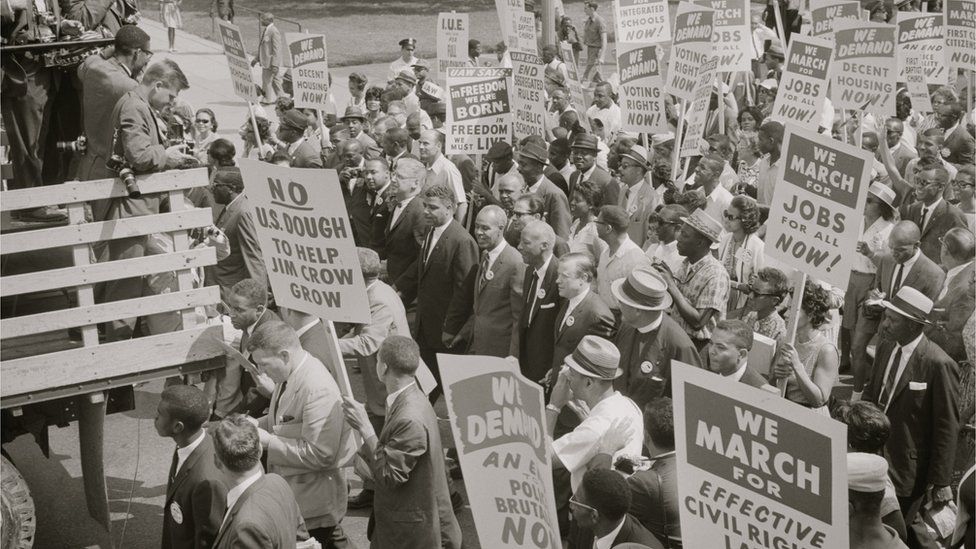Greg Clarke: Why FA chairman's comments are so offensive
- Published

Jim Crow laws ended in the 1960s
Warning: This report contains offensive language.
Greg Clarke has resigned as chairman of the Football Association after using offensive language about black players.
The FA boss had used the term "coloured footballers" as he spoke to MPs about diversity and racial abuse against black players.
He apologised and said he was "a product of having worked overseas, in the USA for many years, where I was required to use the term 'people of colour' because that was a product of their diversity legislature."
Hours later, he quit.
So why is the term considered so offensive?
'Every human has a skin colour'
The term is regarded as an offensive racial slur which recalls a time when casual racism was a part of everyday life.
In the US, because of the country's history of racial segregation, it is among the most offensive words for describing a black person.
"[It] was used to describe anybody who was not white, which may imply that to be white is 'normal' or default," says the charity Show Racism the Red Card.
"If we consider it, every human has a skin colour, so technically we are all coloured."
Rules known as the Jim Crow laws were in place in the US - mainly in the states in the south- from the 1870s until the 1960s.
Drinking fountains which were described as "coloured-only" and transport and schools were segregated.
The phrase Jim Crow originated from a song-and-dance character of the 1800s.
In the stage show a white actor wore blackface to play the role of an African slave. No-one is quite sure how this name became associated with the racial hierarchy the US adopted.
In part because of this association, using the phrase is seen as contributing to racist behaviour, according to Show Racism the Red Card.
It was seen as an acceptable word to use in much of the UK until the 1960s and 1970s.
There are places in the world where "coloured" is used without offence - for example in South Africa, where it refers to people who have multiple heritages.
'People of colour'
In his apology, Greg Clarke said he was used to using the term 'people of colour'.
That's a phrase that can also be controversial.
It is "much better" to use the word black, says Show Racism the Red Card.
"There are lots of rumours that cause people to feel uncomfortable about saying black, but as a descriptive term it is absolutely fine, and is a term that has been chosen by and is used by black people."
The same goes with 'BAME' - some people find the term misleading and argue that it groups all non-white people together when in fact their experiences may be very different.
Allow Twitter content?
This article contains content provided by Twitter. We ask for your permission before anything is loaded, as they may be using cookies and other technologies. You may want to read Twitter’s cookie policy, external and privacy policy, external before accepting. To view this content choose ‘accept and continue’.
The same goes with 'BAME' - some people find the term misleading and argue that it groups all non-white people together when in fact their experiences may be very different.
Show Racism the Red Card was speaking to Radio 1 Newsbeat five years ago, after Benedict Cumberbatch used the term "coloured" when saying that black actors get better opportunities in the US compared with the UK.
He later apologised, saying he was "devastated to have caused offence".
A version of this article originally appeared on 27 January 2015.
Follow Newsbeat on Instagram, external, Facebook, external, Twitter, external and YouTube, external.
Listen to Newsbeat live at 12:45 and 17:45 weekdays - or listen back here.
- Published10 November 2020
- Published30 June 2020
- Published1 June 2018